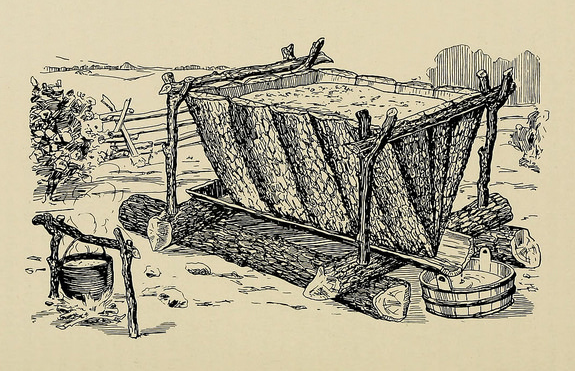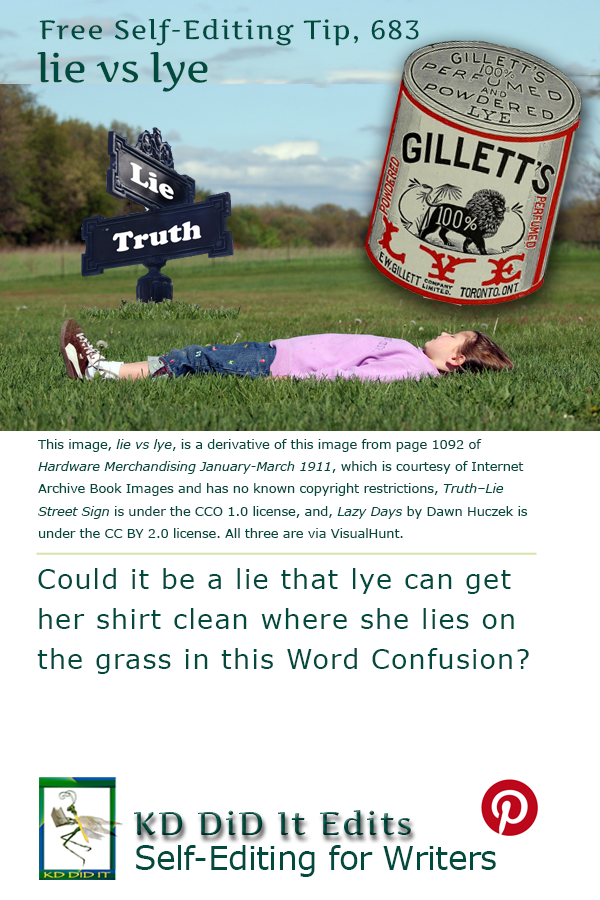Revised as of
6 Dec 2022
Now lye in it? Ouch. Painful. Grab that vinegar! Of course, maybe it had been an historical spelling, as in “Here Lyes My Body” or a place like Lye Railway Station. But then again, there was that bed . . . in which one would lie.
Psst, bet ya didn’t know a form of lye is used in making pretzels!
You may find “Lay versus Lie“, “Lays versus Laze“, “Liar vs Lier vs Lyre“, and “Lain versus Lane“.
Word Confusions . . .
. . . started as my way of dealing with a professional frustration with properly spelled words that were out of context in manuscripts I was editing as well as books I was reviewing. It evolved into a sharing of information with y’all. I’m hoping you’ll share with us words that have been a bête noire for you from either end.
If you found this post on “Lie versus Lye” interesting, consider subscribing to KD Did It, if you’d like to track this post for future updates.
| Lie | Lye |
|---|---|

Lying Female Caracal by Tambako the Jaguar is under the CC BY-ND license, via VisualHunt. — This wild cat lies there with no worries. |

Image from page 205 of Reminiscences of Newcastle, Iowa, 1848 (1921), courtesy of Internet Archive Book Images has no known copyright restrictions, via VisualHunt. — If you want to make a boatload of lye, this looks like the way to do it. |
| Part of Grammar: | |
| Noun; Verb, intransitive & transitive
Plural for the noun: lies Third person present verb: lies |
Noun
Plural: lye |
| Requires no movement at all Recline Noun: An untruth, a fabrication, a statement that is purposefully false Verb, intransitive: You lie down on the sofa. The act of telling an untruth Be in or assume a horizontal position, recline Verb, transitive: |
[Chemistry] A strongly alkaline solution, especially of potassium hydroxide or sodium hydroxide, used for washing or cleansing
[Chemistry] Any solution resulting from leaching, percolation, or the like |
| Examples: | |
| Noun: No, he tells lies all the time. Lie to me again, young lady, and you’ll regret it! He learned his parents had been swindlers and felt his whole childhood had been a lie. Verb, intransitive: She likes to lie out in the meadow. The strength of his performance lies in his training. The lake lies beyond this hill. Our land lies between these trees and the river. Verb, transitive: He could lie himself out of anything. One can always lie one’s way out of a difficulty. |
Lutefisk is a Norwegian delicacy of dried cod tenderized by soaking in lye.
People used to make their own lye by leaching ashes and then making their soap. Aquamation is a totally green, environmentally friendly technology using lye. Lye or banana leaves can be used to make soap. Be very careful using lye, as it can burn your skin and burn holes in your clothes! An acid, vinegar will counteract lye if you do get burned. All soap is made with lye with sodium hydroxide used for hard bar soap or potassium hydroxide used for liquid soaps. That scene in Jean Auel’s The Plains of Passage still sticks with me when Ayla “discovers” the soft soap version of lye. |
| Derivatives: | |
| Noun: liar, lie-down, lie-in | |
| Phrasal Verb | |
| lie down lie in lie to lie with |
|
| History of the Word: | |
| Old English licgan is of Germanic origin and related to the Dutch liggen and the German liegen, from an Indo-European root shared by the Greek lektron, lekhos and the Latin lectus meaning bed. | Old English lēag is of Germanic origin and related to the Dutch loog, the Old High German louga meaning lye and the German Lauge from the Latin lavare, lavere meaning to wash, the Greek louein. |
C’mon, get it out of your system, bitch, whine, moan . . . which words are your pet peeves? Also, please note that I try to be as accurate as I can, but mistakes happen or I miss something. Email me if you find errors, so I can fix them . . . and we’ll all benefit!
Satisfy your curiosity about other Word Confusions on its homepage or more generally explore the index of self-editing posts. You may also want to explore Book Layout & Formatting Ideas, Formatting Tips, Grammar Explanations, Linguistics, Publishing Tips, the Properly Punctuated, Writing Ideas and Resources, and Working Your Website.
Resources for Lie versus Lye
Apple Dictionary.com
The Free Dictionary: lie
Maslowski, Debra. “Can You Make Soap Without Lye (Sodium Hydroxide)?” DIYNatural. n.d. Web. n.d. <https://www.diynatural.com/sodium-hydroxide-lye/>. This post was quite informative in a very natural style. I’ll be bookmarking it.
Pinterest Photo Credits:
This image from page 1092 of Hardware Merchandising January-March 1911, <https://visualhunt.com/f2/photo/14784248195/4574cb702c/>, is courtesy of Internet Archive Book Images and has no known copyright restrictions; Truth–Lie Street Sign, <https://visualhunt.com/photo/142148/>, is under the CCO 1.0 license; and, Lazy Days, <https://visualhunt.com/f2/photo/3594659742/b6b8212731/>, by Dawn Huczek, <https://visualhunt.com/author/066e2a>, is under the CC BY 2.0 license. All three are via VisualHunt.


